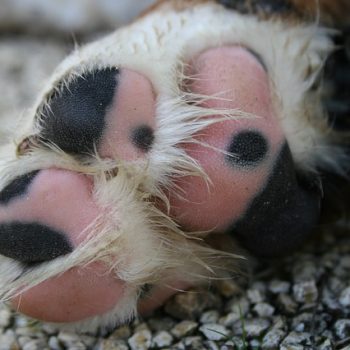They all do it, but some more than others and some are obsessive about it. If you’ve ever tried to go to sleep with background sounds of lick, lick, slurp, chew, lick, you know what I mean when I say it can really get on your nerves. You tell the dog to stop, s/he does for a while and then goes back to it, usually with more fury. Some bite their nails as well. You would too, if you were itchy and prevented from scratching. That’s one side of the coin. The other is neurotic behavior and it’s a tough one to break. Since I’m not a trainer or behaviorist, let me tell you what’s helped dogs that have this issue due to diet and a few other factors.
Diet first: it’s unlikely that the dog is focusing only on paws if the itch is due to food allergy, but it’s not unheard of. Usually, the itch is everywhere, but more severe at the paws, ears, anal area and thighs.
Sometimes, the belly as well. This is the dog who seems to be unable to leave himself alone. Changing the diet to novel foods can be a miracle cure, but it has to be done methodically. In some cases, commercial diets can work, but they tend to contain a myriad of ingredients and the dog can react to any of them. Hydrolyzed diets like Hill’s z/d have helped some dogs, but even if they do, the dog might need to eat them forever. That’s not such a bad thing if quality of life is improved, so I’m not against the approach, but the problem is that some dogs start to react to these diets as well. They shouldn’t, but those who do haven’t read the scientific data saying so. The great majority of dogs do best when fed a home-prepared diet because we can take control of the ingredients.
Other reasons for this behavior:
1) Dry skin
2) Bacterial infection
3) Yeast overgrowths
4) Hormonal inbalance
5) Anxiety
6) Contact allergy
Your dog can have dry skin on the paws despite that other areas of the body look fine. This is especially true during the winter months when salt on roads irritates the area and the air in the home is dry due to the furnace running all the time. Carpets can absorb the natural oils on the skin. I’ve found that simply massaging a drop of vitamin E into the paws really helps. Since it’s non-toxic, there’s no worry if the dog licks the paws, but of course, the behavior should be discouraged so the vitamin E can soak in.
Bacterial infections and yeast overgrowths only become obvious to most people when they see sores, or smelly and moist areas like the ear canal or between the toes. However, both can exist around the nail bed area and many dogs chew their nails due to this. They’re itchy! Medications (some are oral and some is simply shampoo therapy) can get rid of the problem. If your dog continues the behavior and your vet isn’t referring you to a veterinary dermatologist, asking for a referral is one of the best things you can do for your dog. Bacteria can’t be seen with the naked eye and the situation has usually become worse by the time we can see yeast overgrowths, so a specialist who knows how to properly diagnose and treat is worth his/her weight in gold.
Hormonal issues like hypothyroidism can also cause this behavior. Your vet can rule this out by running tests.
Anxiety and stress can cause a dog to bite nails and lick paws. It’s not unlike a nervous child biting their nails or wringing their hand over and over again. The problem here is that the behavior is self-rewarding. The dog feels better when they do it, so they continue doing it and the behavior is established. The only people who’ve I’ve found to be able to curb this are ethologists. They claim that this behavior is not unlike a caged tiger in a zoo pacing all the time. It’s not normal. Improving/enriching the environment might help. Then again, it can be the way an animal is wired in that some become more stressed about certain things and we need to decipher what those things are. In severe cases, anti-anxiety medications seem to help, but most people would resort to this only if the dog was mutilating him/herself.
Lastly, contact allergies are high on the suspect list because the paws are in constant contact with grass, dust, pollens, etc. Rinsing the paws and patting them dry gently can help. In severe cases, the dog can wear dog boots. I’ve had some luck with dipping paws in a mixture of 1 tsp grapefruit seed extract and 10 TBS luke warm water. Just a quick soak and pat dry. It can help, but the dog will be in contact with the allergen again, so if the problem continues after a few days of trying this “foot bath”, a dermatologist would be the best bet.

